
5 Expository Essay Examples (Full Text with Citations)
- Video Overview
- Quick Example
- Formatting Guide
An expository essay attempts to explain a topic in-depth, demonstrating expert knowledge and understanding.
This form of essay is structured around the clear, factual presentation of information, devoid of the writer’s personal opinions or arguments.
The primary goal is to inform or explain rather than persuade.
Unlike an argumentative essay, which is built around defending a particular point of view with evidence and persuasion, an expository essay maintains a neutral stance, focusing on delivering straightforward facts and explanations.
An example of expository writing could be an article explaining the process of photosynthesis.
The article would systematically describe each stage of how plants convert sunlight into energy, detailing the role of sunlight, water, and carbon dioxide.
It would explain the sequence of reactions – first, second, third, fourth, fifth – that occur and the importance of each step in supporting the life of the plant.
An expository essay generally follows this essay format:

- A) To persuade the reader to adopt a particular viewpoint
- B) To inform or explain a topic clearly
- C) To present the writer’s personal opinions and arguments
- D) To entertain the reader with creative writing
- A) An expository essay uses creative storytelling techniques
- B) An expository essay remains neutral and avoids personal opinions
- C) An expository essay focuses on persuading the reader with evidence
- D) An expository essay prioritizes the writer’s personal experiences
Expository Essay Examples
#1 impacts of technology on education.
955 words | 4 Pages | 15 References

Thesis Statement: “The integration of technology in education represents a complex and critical area of study crucial for understanding and shaping the future of educational practices.”
#2 Impacts of Globalization on Education
1450 words | 5 Pages | 9 References

Thesis Statement: “This essay examines the profound and multifaceted effects of globalization on education, exploring how technological advancements and policy reforms have transformed access to, delivery of, and perceptions of education.”
#3 The Role of Emotional Intelligence in Interpersonal Relationships
1211 Words | 5 Pages | 22 References

Thesis Statement: “The central thesis is that EI, defined as the ability to perceive, understand, and manage emotions, is a crucial determinant of success and well-being.”
#4 The Future of Renewable Energy Sources and Their Impact
870 words | 4 Pages | 20 References

Thesis Statement: “The essay posits that although renewable energy sources hold immense promise for a sustainable future, their full integration into the global energy grid presents significant challenges that must be addressed through technological innovation, economic investment, and policy initiatives.”
#5 The Psychology Behind Consumer Behavior
1053 words | 4 Pages | 17 References

Thesis Statement: “The thesis of this essay is that consumer behavior is not merely a product of rational decision-making; it is deeply rooted in psychological processes, both conscious and subconscious, that drive consumers’ choices and actions.”
How to Write an Expository Essay

Unlike argumentative or persuasive essays, expository essays do not aim to convince the reader of a particular point of view.
Instead, they focus on providing a balanced and thorough explanation of a subject.
Key characteristics of an expository essay include:
- Clarity and Conciseness
- Structured Organization (Introduction, Body, Conclusion)
- Objective Tone
- Evidence-Based (Cite academic sources in every body paragraph)
- Objective thesis statement (see below)
- Informative purpose (Not argumentative)
You can follow my expository essay templates with AI prompts to help guide you through the expository essay writing process:

How to write a Thesis Statement for an Expository Essay
An expository thesis statement doesn’t make an argument or try to persuade. It uses ‘is’ rather than ‘ought’ statements.
Take these comparisons below. Note how the expository thesis statements don’t prosecute an argument or attempt to persuade, while the argumentative thesis statements clearly take a side on an issue:
💡 AI Prompt for Generating Sample Expository Thesis Statements An expository essay’s thesis statement should be objective rather than argumentative. Write me five broad expository thesis statement ideas on the topic “[TOPIC]”.
Go Deeper: 101 Thesis Statement Examples
Differences Between Expository and Argumentative Essays
Expository and argumentative essays are both common writing styles in academic and professional contexts, but they serve different purposes and follow different structures.
Here are the key differences between them:
- Expository Essay : The primary purpose is to explain, describe, or inform about a topic. It focuses on clarifying a subject or process, providing understanding and insight.
- Argumentative Essay : The goal is to persuade the reader to accept a particular point of view or to take a specific action. It’s about presenting a stance and supporting it with evidence and logic.
- Expository Essay : It maintains a neutral and objective tone. The writer presents information factually and impartially, without expressing personal opinions or biases.
- Argumentative Essay : It often adopts a more assertive, persuasive, and subjective tone. The writer takes a clear position and argues in favor of it, using persuasive language.
- Expository Essay : The reader is expected to gain knowledge, understand a process, or become informed about a topic. There’s no expectation for the reader to agree or disagree.
- Argumentative Essay : The reader is encouraged to consider the writer’s viewpoint, evaluate arguments, and possibly be persuaded to adopt a new perspective or take action.
Go Deeper: Expository vs Argumentative Essays
Ready to Write your Essay?

Take action! Choose one of the following options to start writing your expository essay now:
Read Next: Process Essay Examples

Chris Drew (PhD)
Dr. Chris Drew is the founder of the Helpful Professor. He holds a PhD in education and has published over 20 articles in scholarly journals. He is the former editor of the Journal of Learning Development in Higher Education. [Image Descriptor: Photo of Chris]
- Chris Drew (PhD) https://helpfulprofessor.com/author/chris-drew-phd/ 15 Self-Actualization Examples (Maslow's Hierarchy)
- Chris Drew (PhD) https://helpfulprofessor.com/author/chris-drew-phd/ Forest Schools Philosophy & Curriculum, Explained!
- Chris Drew (PhD) https://helpfulprofessor.com/author/chris-drew-phd/ Montessori's 4 Planes of Development, Explained!
- Chris Drew (PhD) https://helpfulprofessor.com/author/chris-drew-phd/ Montessori vs Reggio Emilia vs Steiner-Waldorf vs Froebel
Leave a Comment Cancel Reply
Your email address will not be published. Required fields are marked *
How to Write an Expository Essay: Definition, Outline, Writing Tips, and Examples

In the realm of academic writing, this type of essay stands as a beacon of clarity, demanding writers to illuminate a subject with precision and objectivity. Whether you're a seasoned essayist or a student embarking on your first exploration of this genre, mastering the art of expository writing is a valuable skill that transcends disciplines. This form of essay invites you to delve into expository essay topics, dissect their intricacies, and present your findings in a straightforward manner.
In this comprehensive guide, we will explore the terrain of expository writing, unraveling the techniques and strategies that transform a mere composition into a beacon of insight. From understanding the fundamental principles to honing your ability to craft a compelling thesis, join us on a journey that promises to demystify the process of writing, empowering you to articulate ideas with clarity and purpose. Or, you can get our essay writing help and take care of other important tasks set for today.
What Is an Expository Essay
An expository essay is a form of academic writing that aims to elucidate, clarify, and present a balanced analysis of a particular topic or idea. Unlike other essay types that may delve into personal opinions or narratives, the expository essay emphasizes objectivity and factual accuracy. The primary objective is to provide a clear and comprehensive explanation of the chosen subject, exploring its various facets, presenting evidence, and ensuring a logical progression of ideas.
.webp)
According to an expository essay definition, this genre requires the writer to delve into research, organize information systematically, and deliver a coherent and informative piece that educates the reader on the chosen topic. Whether investigating a scientific concept, historical event, or literary work, it serves as a vehicle for conveying knowledge in a concise, lucid manner.
Expository Essay Examples
An expository essay example serves as a valuable tool for students, offering a concrete illustration of the structure, style, and depth expected in this genre of writing. By studying examples, students gain insights into effective thesis formulation, organizing ideas within paragraphs, and integrating supporting evidence to bolster arguments.
Additionally, examples showcase how to balance factual accuracy and engaging prose, providing a model for clear and concise communication. Students can draw inspiration from the content and presentation of well-crafted expository essays, honing their own skills in research, analysis, and effective expression. By the way, we have an interesting autobiography example , so check it out!
Example 1: “The Evolution of Artificial Intelligence”
This expository essay explores the multifaceted evolution of artificial intelligence (AI), examining its historical roots, contemporary applications across various industries, and the consequential societal impact. It provides a comprehensive overview of AI's journey from philosophical debates and early computational developments to its current role as a transformative force in healthcare, finance, manufacturing, and entertainment. Additionally, the essay addresses ethical considerations surrounding the widespread adoption of AI, including concerns related to job displacement, privacy, and responsible development. Ultimately, it navigates the complex landscape of artificial intelligence, shedding light on its remarkable advancements and its challenges to our ever-changing society.
Example 2: “The Benefits of Outdoor Education for Children”
This essay highlights the advantages of outdoor education for children, emphasizing its positive impacts on their physical, mental, and social development. It argues that outdoor activities like hiking, camping, and team sports not only promote physical health by encouraging movement and reducing sedentary behavior but also contribute to mental well-being by providing a respite from everyday stressors and fostering a connection with nature. Furthermore, it suggests that exposure to outdoor environments cultivates environmental awareness and a sense of stewardship among children.
Need some help with your homework?
Get help from our expository essay writing service ! Leave us a notice and we'll make your tasks asap.
Types of Expository Essay
Expository essays come in several distinct types, each serving a unique purpose and requiring specific approaches to convey information effectively. One common categorization includes:
- Descriptive Expository Essay. This type focuses on painting a vivid picture of a subject, using sensory details to engage the reader's imagination. It aims to create a clear and sensory-rich portrayal of a person, place, object, or experience.
- Process Expository Essay. Here, the writer breaks down a complex process or procedure into manageable steps, providing a detailed and sequential explanation. This type of essay is instructional, guiding readers through a series of actions to achieve a specific outcome.
- Comparison and Contrast Expository Essay. This form involves analyzing similarities and differences between two or more subjects, offering insights into their shared characteristics or divergent qualities. It requires a careful examination of the chosen elements to highlight their relationships.
- Cause and Effect Expository Essay. Focused on exploring the reasons behind an occurrence and its subsequent consequences, this type delves into the cause-and-effect relationships within a given topic. Writers elucidate the connections between actions and outcomes, fostering a deeper understanding of the subject matter.
- Problem and Solution Expository Essay. Addressing real-world issues, this essay type identifies a specific problem, analyzes its root causes, and proposes viable solutions. It encourages critical thinking and problem-solving skills, compelling readers to consider alternative approaches to challenges.
- Definition Expository Essay. This essay seeks to clarify and explain the meaning of a particular term, concept, or idea. Writers provide a comprehensive definition, often including examples and illustrations to ensure readers grasp the essence of the subject.
- Cause and Effect Expository Essay. This type of essay examines the reasons behind a particular phenomenon or event and explores its subsequent effects. It aims to establish a clear cause-and-effect relationship, allowing readers to comprehend the interconnected elements of the topic.
Understanding these diverse types of essays empowers writers to choose the most suitable approach for effectively conveying information and achieving their communicative goals. Our experts can rewrite essay that you already did according to any of the above-mentioned types.
Expository Essay Topics
Selecting compelling expository essay topics requires thoughtful consideration of both personal interest and the potential engagement of the intended audience. Start by identifying subjects that genuinely captivate your curiosity or align with your expertise, as this enthusiasm will naturally infuse vigor into your writing. Additionally, assess the topic's relevance in the broader context, ensuring it addresses contemporary issues or timeless themes.
Consider the audience's interests, aiming for subjects that resonate with their experiences or evoke a sense of shared relevance. Striking a balance between uniqueness and accessibility is key—opt for topics that allow you to offer fresh perspectives while ensuring there is ample research material available. Ultimately, the best topics seamlessly blend your passion, the audience's interests, and the broader significance of the chosen subject, ensuring a captivating and informative exploration for both writer and reader alike. Here are expository essay ideas from our writers for your inspiration:
.webp)
- The influence of art on human emotions.
- Exploring the life cycle of a star.
- Tips for sustainable living in urban areas.
- The impact of social media on political awareness.
- How to cultivate a positive mindset in challenging times.
- The history and cultural significance of tattoos.
- The process of recycling electronic waste.
- Benefits of incorporating meditation into daily routines.
- The role of laughter in maintaining mental health.
- Understanding the psychology of decision-making.
- The impact of fashion on individual expression.
- Tips for effective conflict resolution in relationships.
- The science behind the sense of taste.
- The significance of biodiversity in ecosystems.
- Exploring the history of traditional folk music.
- How to foster a sense of community in a neighborhood.
- The benefits of learning a musical instrument.
- The evolution of communication technologies.
- The process of seed germination in plants.
- Tips for creating a productive home office space.
- The impact of artificial intelligence on job markets.
- Understanding the concept of emotional intelligence.
- The benefits of practicing gratitude daily.
- The history and cultural importance of tea.
- How to develop effective public speaking skills.
- Exploring the world of virtual reality technology.
- The significance of water purification methods.
- Tips for maintaining a healthy work-life balance.
- The process of making sustainable food choices.
- The role of literature in shaping societal norms.
Expository Essay Outline
An outline for expository essay is a structured plan that serves as a roadmap for organizing the main ideas and supporting details of the essay in a logical and coherent manner. While the specific structure may vary based on the assignment or preferences, a typical outline generally includes the following components, beginning with how to start an expository essay:
.webp)
Expository Essay Introduction
- Hook or attention-grabbing statement.
- Background information on the topic.
- Clear thesis statement that presents the main idea.
Body Paragraphs (usually three or more)
- Topic sentence for each paragraph, presenting a main point or supporting idea.
- Supporting evidence, facts, or examples to illustrate and explain the topic sentence.
- Analysis or interpretation of the evidence to connect it back to the thesis.
Expository Essay Conclusion
- Restatement of the thesis in different words.
- Summary of the main points discussed in the body paragraphs.
- Concluding thoughts or insights, possibly suggesting implications or future considerations.
Transitions
- Smooth transitions between paragraphs to ensure a cohesive flow of ideas.
- Clear connections between sentences and paragraphs to guide the reader through the essay.
Revising and Editing
- Space for notes on areas that may need revision or improvement.
- Consideration of clarity, coherence, and overall effectiveness.
By creating an expository essay outline, a college essay writer can organize their thoughts, ensure a logical progression of ideas, and maintain a clear and concise structure. This framework helps writers stay focused on the main purpose of the essay – to inform, explain, or analyze a particular subject – while providing a roadmap for readers to follow and comprehend the information presented.
How to Write an Expository Essay Step by Step
Writing an expository essay involves a systematic process that ensures clarity, coherence, and effectiveness in conveying information. Here is a step-by-step guide to help you craft an expository essay:
Choose a Topic
- Select a topic that interests you and aligns with the purpose of an expository essay – to inform, explain, or analyze a subject.
Conduct Research
- Gather relevant and credible information to support your chosen topic.
- Utilize reputable sources such as academic journals, books, and reliable websites.
Create an Outline
- Develop a clear and organized outline that includes the introduction, body paragraphs, and conclusion.
- Each section should have a specific purpose and contribute to the overall coherence of the essay.
Write the Introduction
- Start with an attention-grabbing hook that relates to your topic.
- Provide background information and context, leading to a concise and focused thesis statement that outlines the main idea.
Develop Body Paragraphs
- Each body paragraph should begin with a clear topic sentence that introduces the main point.
- Support the topic sentence with evidence, facts, or examples.
- Ensure a logical flow between paragraphs, using transitions to guide the reader.
Provide Evidence
- Support your points with credible evidence and examples.
- Ensure that each piece of evidence directly relates to the topic sentence and supports the overall thesis of the essay.
Analyze and Interpret
- After presenting evidence, analyze and interpret it.
- Explain the significance of the evidence and how it relates to your thesis.
- This step helps to ensure that your audience understands the relevance of the information presented.
Write the Conclusion
- Summarize the main points discussed in the body paragraphs without introducing new information.
- Restate the thesis in different words and offer concluding insights or implications related to the topic.
Revise and Edit
- Review your essay for clarity, coherence, and consistency.
- Check for grammatical errors and awkward phrasing, ensuring a smooth flow of ideas.
- Consider feedback from others or take a break before revising to gain a fresh perspective.
- Carefully proofread your essay to catch any remaining errors, typos, or issues.
- Pay attention to grammar and punctuation.
By following these steps, you can systematically approach the writing process and create a well-organized and informative expository essay. Remember to stay focused on the purpose of informing, explaining, or analyzing the chosen topic throughout the entire writing process.
Final Thoughts
Learning how to write an expository essay offers students several important advantages. First off, it helps them express their thoughts clearly and organize ideas effectively, skills that are useful not only in academics but also in various professional situations where clear communication is key.
Moreover, writing expository essays improves critical thinking as students practice analyzing information, connecting ideas, and presenting well-supported arguments. This skill is valuable in everyday decision-making and problem-solving scenarios.
Additionally, the process of crafting such essays enhances research abilities, teaching students how to find, evaluate, and use information effectively. Overall, mastering expository writing equips students with practical, transferable skills that can positively impact their academic and professional pursuits. You can use our research paper service to cope with assignments better and faster.
Want to Ace Your Expository Writing?
Your wish is our command - order now and experience the excellence of our expert writers!
What are the Different Types of Expository Essays?
What is the most important part of the expository essay structure, what is the main idea in expository writing.

Daniel Parker
is a seasoned educational writer focusing on scholarship guidance, research papers, and various forms of academic essays including reflective and narrative essays. His expertise also extends to detailed case studies. A scholar with a background in English Literature and Education, Daniel’s work on EssayPro blog aims to support students in achieving academic excellence and securing scholarships. His hobbies include reading classic literature and participating in academic forums.

is an expert in nursing and healthcare, with a strong background in history, law, and literature. Holding advanced degrees in nursing and public health, his analytical approach and comprehensive knowledge help students navigate complex topics. On EssayPro blog, Adam provides insightful articles on everything from historical analysis to the intricacies of healthcare policies. In his downtime, he enjoys historical documentaries and volunteering at local clinics.
Related Articles
.webp)
Expository Essay Guide
Expository Essay Examples
Last updated on: Nov 20, 2023
5+ Expository Essay Examples to Help you Get Started
By: Donna C.
Reviewed By: Jacklyn H.
Published on: Mar 22, 2023

Want to write an expository essay that will elevate your grades? Don't know what to do and what to avoid?
It can be hard to know where to start when you're writing an expository essay. Do you begin with the facts or with your own opinion? How do you structure your argument?
Let us guide you with expository essay examples!

On this Page
What is an Expository Essay?
An expository essay is a form of writing which examines and investigates a certain idea or concept in order to present evidence that supports the ideas.
It is used to evaluate the analytical skills of students in both middle school and high school.
Writing an expository essay often requires one to thoroughly research the topic, and use primary and secondary sources. Such writings are designed to explain facts, ideas, and concepts in an objective and informative manner.
This form of writing relies on presenting hard evidence in the form of statistical data, charts, graphs, and other visual presentations to support the information. By utilizing these methods of presentation, it becomes easier to explain the facts clearly.
Here is a complete guide that will help you learn more about writing an expository essay .
The expository essay examples will demonstrate how to write an expository essay without missing anything. These examples will help you in understanding the basics and once you are through them, you will be ready to write your essay in no time.
THE RISE OF TEENAGE GANGS AND ITS CONSEQUENCES
WAYS STUDENTS CAN SPEND THEIR LEISURE TIME
THE HISTORY OF CHESS
THE HISTORY OF THE AMERICAN FLAG
AN ANALYSIS OF CULTURAL DIVERSITY AND WHY DOES IT MATTER
WHY DO WE NEED EXCELLENT COMMUNICATION SKILLS
STEPHEN HAWKING - A LIFE HISTORY
WASTE MANAGEMENT FACTS AND FUTURE

Tough Essay Due? Hire Tough Writers!
You can generate even more examples specific to your topic and area of study using our AI essay generator for free!
How to Write an Expository Essay Outline?
An expository essay outline is just like any other essay and because you have been writing essays since your school years, you will have no difficulties. However, the difficult part is to know the type of information that will go into each section.
We have divided and explained the entire process that is essential to write an expository essay successfully.
The Prewriting Phase
For an effective essay, you need to plan the entire essay before writing. Many students try to do the essay without planning and end up nowhere. Instead of just getting into the paper writing process, brainstorm and think about how you can present the ideas in a structured manner.
Make points of what you will add in each section.
Preparing the First Draft
After brainstorming and noting down every main detail and theme, prepare the first draft of the essay. Add what points you will add in each section. An expository essay structure has the following sections:
- Introduction: An introduction is the first section of an essay. It is a brief mention of the main points and themes of the essay. It includes the background of the main topic and some information about it. However, everything is added briefly.
- Thesis Statement: A well-defined but brief thesis statement will elevate your essay and inform the readers about the main theme of your essay. However, the thesis statement should be brief and should not present the whole theme of the essay.
- Body Paragraphs: Generally, these are three in number and present three main ideas. These paragraphs of the essay examine, analyze and present the main ideas along with the supporting evidence. Each sentence must begin with a topic sentence and expound on the main idea of that paragraph.
- Conclusion: It is the last encounter between you and the readers and this is why it must be strong and memorable. Restate your thesis statement and the overall essence of the essay. You can do it by mentioning the main points briefly or by just presenting the answer to the main essay question.
Final Revision
Revision is the most important part of the writing process. In this phase, you can revise, modify and restructure your essay and rectify it according to the guidelines and main essay question. Some of the things to consider while revising your essay are:
- Have you answered the main question properly and completely?
- Does your essay meet all the guidelines of the instructor?
- Have you added all the main ideas in the essay?
- Is there a proper transition between the sentences and paragraphs?
- Are all the paragraphs consistent and well-structured?
Answering these questions is a must and therefore, you should never miss this part.
Proofreading
After you are done, proofread the entire essay before submitting it. It may seem daunting and dull but, just like revision, proofreading is also important. Proofread the essay thoroughly and see if everything is in line. At this stage, you can still make the changes.
We hope that these tips will act as a writing guide for you and will help you in writing an excellent expository essay.
Paper Due? Why Suffer? That's our Job!
What are the Other Types of Expository Essays?
This type of essay is further divided into the following types of expository writing. These are explained below
Descriptive Essay: This essay requires describing a place, person, or event in detail. It includes great sensory details and is written to persuade the reader to see the writer’s viewpoint.
Definition Essay: A definition essay describes a certain phrase or term in detail. The topics can be concrete or abstract in nature and include the explanation of both literal and contextual meanings of the chosen word.
Compare and Contrast: These essays explain two or more things by comparing and contrasting them. They highlight the main points and describe the chosen objects by elaborating their various elements and qualities.
Classification Essay: The writer breaks down the main essay topic and divides it into several classes and categories and explains them one by one.
Process Essay: The writer breaks down a process and explains it in detail. This could be a manufacturing process, a recipe, and even a writing process. It explains the how-to process and how to do it in detail.
Cause and Effect Essay: This essay describes the reasons behind a phenomenon or happening. It explains why something happens and what are the causes behind them. In short, a cause and effect essay explains the relationship between a certain event and its reasons.
Get Professional Writing Help!
All in all, an expository essay is a very useful tool that helps students improve their writing skills. If you're still having trouble with your essay, don't hesitate to ask for help.
But don't worry! If you are looking up “who can write my essay for me?” Well, you’re in the right place!
5StarEssays.com is an experienced and skilled essay writing service that works with students that are looking for some help. All of our professional writers have exceptional writing skills and will provide a top-quality essay within your deadline. This is what makes us the best.
Order your essay now.

Marketing, Literature
Donna has garnered the best reviews and ratings for her work. She enjoys writing about a variety of topics but is particularly interested in social issues, current events, and human interest stories. She is a sought-after voice in the industry, known for her engaging, professional writing style.
Was This Blog Helpful?
Keep reading.
- Expository Essay - A Complete Guideline to Help You Write

- Expository Essay Topics Recommended by Experts

- How to Write an Expository Essay Outline - Complementary Template Added

People Also Read
- types of plagiarism
- article review
- personal statement examples
- writing personal statement
Burdened With Assignments?

Advertisement
- Homework Services: Essay Topics Generator
© 2024 - All rights reserved
- Link to facebook
- Link to linkedin
- Link to twitter
- Link to youtube
- Writing Tips
How to Write an Expository Essay
4-minute read
- 29th March 2020
An expository essay explains something. This means investigating an idea, looking at evidence, coming to a conclusion, and explaining your thinking. But how do you write a strong expository essay? Our top tips include:
- Read the essay prompt carefully and using it to guide your research.
- Come up with a thesis statement (i.e., a position that you’ll explain).
- Plan the structure of your essay before you start writing.
- Once you have a first draft, revise and proofread to make sure it is perfect.
For more advice on how this works, check out the guide below.
1. Read Your Essay Prompt
Most expository essay prompts will ask you to do one of the following:
- Define and explain a concept or theory.
- Compare and contrast two ideas.
- Examine a problem and propose a solution.
- Describe a cause and effect relationship.
- Explain a step-by-step process.
- Analyze a broad subject and classify examples into groups.
When you’ve been set an expository assignment, then, check the prompt or question carefully. You can use the phrasing to guide your research. You may also need to select a topic to write about. If so, try to think of something:
- You already know at least something about.
- You find interesting enough to research.
- That fits with the instructions in the essay prompt (e.g., if you’ve been asked to contrast two things, you’ll need a topic that allows for a comparison).
- That is narrow enough to discuss in one essay.
Start by brainstorming topics, then narrow it down to one or two ideas.
2. Come Up with a Thesis Statement
Once you have a topic, you’ll need to do some research and develop a thesis statement. This is the proposition or position that you’ll explain in your essay.
Your thesis statement should be something you can back up with evidence and facts, as well as something that answers the question in your essay prompt. Keep in mind, too, that an expository essay should present a balanced account of the facts available, not personal opinions. For instance, we’ve come up with thesis statements for a few example essay prompts:
When you’ve selected a thesis, make sure you’ve got evidence to back it up! This may mean doing a little more research before you start writing.
Find this useful?
Subscribe to our newsletter and get writing tips from our editors straight to your inbox.
3. Structuring an Expository Essay
The exact length and content of your essay will depend on the topic and prompt. However, most expository essays follow a similar basic structure:
- Introduction – A paragraph where you introduce the essay topic and your thesis statement (i.e., the issue or idea you will explain in the essay).
- Main Body – A series of short paragraphs in which you explain your thesis statement, providing evidence and arguments to support each point.
- Conclusion – A final paragraph where you restate your thesis and how your evidence supports this. Try not to introduce any new information here (if it’s important, it should go in the main body).
- References – If required, include a bibliography of sources you’ve used.
Before you start writing, then, create an essay outline with the structure above in mind and plan what each paragraph will say.
4. Editing and Proofreading
When you have a first draft, take a break and re-read it. Now comes the redrafting ! This is where you go back over your essay and look for areas to improve. Do you provide enough evidence? Is your argument clear? Even a few tweaks may increase your mark, so make sure to redraft at least once!
Finally, make sure to have your essay proofread before you submit it for marking. This will ensure your writing is error free and easy to read, giving you an even better chance of getting the grades you deserve.
Share this article:
Post A New Comment
Got content that needs a quick turnaround? Let us polish your work. Explore our editorial business services.
9-minute read
How to Use Infographics to Boost Your Presentation
Is your content getting noticed? Capturing and maintaining an audience’s attention is a challenge when...
8-minute read
Why Interactive PDFs Are Better for Engagement
Are you looking to enhance engagement and captivate your audience through your professional documents? Interactive...
7-minute read
Seven Key Strategies for Voice Search Optimization
Voice search optimization is rapidly shaping the digital landscape, requiring content professionals to adapt their...
Five Creative Ways to Showcase Your Digital Portfolio
Are you a creative freelancer looking to make a lasting impression on potential clients or...
How to Ace Slack Messaging for Contractors and Freelancers
Effective professional communication is an important skill for contractors and freelancers navigating remote work environments....
3-minute read
How to Insert a Text Box in a Google Doc
Google Docs is a powerful collaborative tool, and mastering its features can significantly enhance your...

Make sure your writing is the best it can be with our expert English proofreading and editing.
How to Write an Expository Essay
#scribendiinc
Does Expository Writing Have You Confused?
Maybe you find yourself on this page because your instructor asked you to write an expository essay, and you aren't exactly sure what's expected of you—if so, you've certainly found the right place. Expository writing, or exposition, is a type of discourse used to describe, explain, define, inform, or clarify. It literally means "to expose." Exposition can be found in writing or oral discourse, but for the sake of this article, we'll stick with expository writing.
You are likely familiar with expository writing already, even if the name sounds unfamiliar. Common examples include newspaper articles, how-to manuals, and assembly instructions. Expository writing is also the most frequent type of academic writing !
Present the facts, and only the facts
If you are asked to write an expository essay, then you are essentially being asked to present the facts; there is no place for bias or opinion in expository writing. In a way, this makes writing simple—it is a matter of gathering and presenting the facts about a certain topic.
Something important to keep in mind when writing exposition is that you should not assume your readers have any knowledge of the topic; don't gloss over basic or important details, even if you think they're common knowledge.
When writing expository essays, it is best to use third person narration, although second person is acceptable in some instances, such as for instructions—or articles on expository writing.
Characteristics of expository writing
There are a few characteristics of expository writing you should remember when crafting an expository essay. The first is to keep a tight focus on the main topic, avoiding lengthy tangents, wordiness, or unrelated asides that aren’t necessary for understanding your topic.
In the same vein, be sure to pick a topic that is narrow, but not so narrow that you have a hard time writing anything about it (for example, writing about ice cream would be too broad, but writing about ice cream sold at your local grocery store between 5:00 and 5:15 pm last Saturday would be too narrow).
You must also be sure to support your topic, providing plenty of facts, details, examples, and explanations, and you must do so in an organized and logical manner. Details that can support your expository writing include:
- Comparisons
- Descriptive details
- Definitions
- Charts and graphs
Formatting an expository essay
The typical format for an expository essay in school is the traditional five-paragraph essay. This includes an introduction and a conclusion, with three paragraphs for the body of the paper. Most often, these three paragraphs are limited to one subtopic each.
This is the basic essay format, but expository writing does not need to be limited to five paragraphs. No matter how long your essay is, be sure your introduction includes your thesis statement and that the paper is based on facts rather than opinions. And, as with all good essay writing , make sure to connect your paragraphs with transitions.
Methods for writing an expository essay
There are a few different methods for writing an expository essay. These include:
- Compare and contrast
- Cause and effect
- Problem and solution
- Extended definition
Generally, you will want to pick one method for each piece of expository writing. However, you may find that you can combine a few methods. The important thing is to stay focused on your topic and stick to the facts.
Now that you have a clearer understanding of expository writing, you're ready to write your essay. One final tip: be sure to give yourself plenty of time for the writing process. After you've completed your first draft, let your paper sit for a few days—this lets you return to it with fresh eyes. If you'd like a second opinion, our essay editors are always available to help.
Image source: picjumbo_com/Pixabay.com
Let’s Make an Impact on Your Reader
Hire one of our expert editors , or get a free sample.
Have You Read?
"The Complete Beginner's Guide to Academic Writing"
Related Posts

Essay Writing: Traffic Signals for the Reader

Five Habits to Avoid in Your Academic Writing

How to Write a Great Thesis Statement
Upload your file(s) so we can calculate your word count, or enter your word count manually.
We will also recommend a service based on the file(s) you upload.
English is not my first language. I need English editing and proofreading so that I sound like a native speaker.
I need to have my journal article, dissertation, or term paper edited and proofread, or I need help with an admissions essay or proposal.
I have a novel, manuscript, play, or ebook. I need editing, copy editing, proofreading, a critique of my work, or a query package.
I need editing and proofreading for my white papers, reports, manuals, press releases, marketing materials, and other business documents.
I need to have my essay, project, assignment, or term paper edited and proofread.
I want to sound professional and to get hired. I have a resume, letter, email, or personal document that I need to have edited and proofread.
Prices include your personal % discount.
Prices include % sales tax ( ).

- Features for Creative Writers
- Features for Work
- Features for Higher Education
- Features for Teachers
- Features for Non-Native Speakers
- Learn Blog Grammar Guide Community Events FAQ
- Grammar Guide
Expository Writing: Definition and Examples

Hannah Yang

Table of Contents
What is expository writing, what is an expository paragraph, expository writing examples, how prowritingaid can help you with expository composition.
One of the most common types of writing is expository writing. Whether you’re a student taking an English class or a professional trying to communicate to others in your field, you’ll need to use expository writing in your day-to-day work.
So, what exactly does this term mean?
The short answer is that expository writing refers to any writing designed primarily to explain or instruct.
Read on to learn the definition of expository writing as well as some examples of what this type of writing can look like.
Before we look at examples of expository writing, let’s start with a quick definition of what this term actually means.
Expository Writing Definition
The term expository writing refers to any writing that’s designed to explain something. We use the word expository to describe any passage of writing that’s supposed to present information and help you understand it in an objective way.
Some common examples of expository writing include academic essays, textbooks, instructional guides, and news reports. Good expository writing should be factual, objective, and clear.

To better understand what this term means, think about the difference between a scientific article, a short story, and an advertisement.
The scientific article is considered expository writing because its primary purpose is to explain a particular topic in more detail. It presents data, analyzes what that data means, and focuses on the facts.
On the other hand, the short story isn’t considered expository writing, because its core purpose isn’t to explain or inform—instead, it’s probably trying to entertain you or to take you on a journey. Short stories are narrative writing.
Similarly, an advertisement isn’t expository writing because its core purpose isn’t to explain or inform—instead, it’s trying to persuade you to buy what it’s selling. Advertisements are persuasive writing.
Here’s a quick rundown of what expository essays should and shouldn’t do.
An expository essay should:
Teach the reader about a particular topic
Focus on the facts
Follow a clearly organized structure
Present information and details from credible sources
An expository essay should not:
Try to change the reader’s mind about something
Present the author’s personal opinions
Include made-up narratives or stories
Follow experimental or nonlinear structures

An expository paragraph is exactly what it sounds like—a paragraph of expository writing.
A well-written expository paragraph should follow a specific format to make it as clear and easy to read as possible. Most expository paragraphs do the following things:
Start with a topic sentence, which explains what the paragraph will be about
Then, include 3 – 5 body sentences that provide supporting details for the topic sentence
Finally, wrap things up with a closing sentence that summarizes what the paragraph has said
Writing an expository paragraph is a great way to practice expository writing. That’s because the paragraph follows the same structure as a more complex expository essay, just on a smaller scale.
Most expository essays should follow this format:
Start with an introductory paragraph that includes the thesis statement, which tells the reader the core statement of the essay
Then, include 3 – 5 body paragraphs that provide factual evidence to support the thesis statement
Finally, wrap things up with a concluding paragraph that summarizes what the body paragraphs and thesis statement said
You can see the similarities between the two formats. If you can write a fantastic expository paragraph, you’ll be well-prepared to move on to writing a full expository essay.
Example of Expository Paragraph
Here’s an example of an expository paragraph that follows the structure described above.
The leading cause of death in the United States is heart disease, which can be fatal if it leads to heart attack or cardiac arrest. Heart attacks occur when a blockage in the coronary artery prevents oxygenated blood from reaching the heart. Cardiac arrests occur when the heart stops pumping entirely, which prevents the patient from breathing normally. Both of these problems can be deadly, even in seemingly healthy people who don’t have noticeable risk factors. As a result, heart disease is an important problem that many doctors and scientists are researching.

Good writing = better grades
ProWritingAid will help you improve the style, strength, and clarity of all your assignments.
There are many ways you can present information in an expository essay. Here are four of the most popular ways, along with examples of each one.
Problem and Solution Essay
A problem and solution essay presents the reader with a problem and then considers possible solutions to that problem.
Here’s an example passage you might find in a problem and solution essay:
Among the many proposed solutions to rising carbon emissions, one promising possibility is carbon trapping. Scientists are figuring out how to pull carbon emissions out of the atmosphere and trap it in less harmful forms, such as by injecting carbon dioxide underground so it will turn to stone.
Compare and Contrast Essay
This type of essay takes two subjects and compares and contrasts them. It focuses on highlighting the differences and similarities between those two things.
Here’s an example passage of this type of expository writing:
Though country music and R&B music have very different sounds, they also share many similarities. For one thing, both types of music embody a specific cultural identity. For another, both genres trace their roots back to the 1920s, when the Victor Talking Machine Company signed singers from the American South.
Classification Essay
In a classification essay, you describe the categories within a certain group of things.
Here’s an example passage you might find in a classification essay:
There are three ways in which artificial intelligence might become stronger than humans in the future: high speed, high collective intelligence, and high quality. A speed AI would be able to perform calculations and experience the world much faster than humans. A collective intelligence, like a hive mind, would be able to break down a complex task into several parts and pursue them simultaneously. Finally, a quality AI would simply be able to solve more complex problems than humans could.
Process Essay
In a process essay, you give the reader the steps for completing a specific process. This is similar to a how-to guide or an instruction manual.
Here’s an example passage you might find in this type of expository writing:
Caramelize the chopped onions in a frying pan. When the onions have caramelized, mix in the bell peppers, mushrooms, and tomatoes and stir for 4 – 6 minutes or until all the ingredients have softened. If you want to add meat, you can add ground beef and cook for another 4 – 6 minutes. Season with salt and pepper to taste.
Good expository writing should be easy to read. After all, the purpose of exposition is to explain things to your readers, and you won’t be able to accomplish that if they have trouble understanding your writing.
That’s why ProWritingAid can help you write an expository essay. The grammar checker can help you ensure your sentences flow well, you’re not missing any necessary punctuation, and all your words are precise and clear.
Good luck, and happy writing!
Hannah is a speculative fiction writer who loves all things strange and surreal. She holds a BA from Yale University and lives in Colorado. When she’s not busy writing, you can find her painting watercolors, playing her ukulele, or hiking in the Rockies. Follow her work on hannahyang.com or on Twitter at @hannahxyang.
Get started with ProWritingAid
Drop us a line or let's stay in touch via :
- Our Writers
- How to Order
- Assignment Writing Service
- Report Writing Service
- Buy Coursework
- Dissertation Writing Service
- Research Paper Writing Service
- All Essay Services
- Buy Research Paper
- Buy Term Paper
- Buy Dissertation
- Buy Case study
- Buy Presentation
- Buy Personal statement
Expository Essay
Complete Guide to Expository Essays: Writing Help and Topics
11 min read
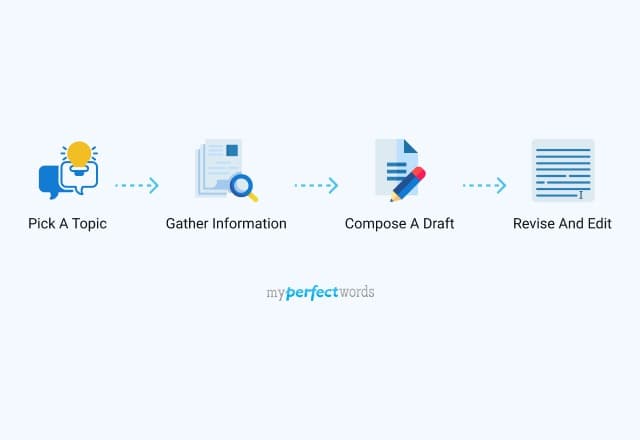
People also read
Interesting Expository Essay Topics For Your Next Paper
How to Write an Expository Essay Outline Like a Pro
Types of Expository Writing - Definition and Examples
Free Expository Essay Examples For Students
Ultimate Guide to Writing an Expository Essay About a Person
Learn to Write an Expository Essay About Yourself
Learn the Basics of Crafting an Expository Essay about a Book
Learn to Write Expository Essay About Mental Health - Examples & Tips
How to Write an Expository Essay about Bullying: A Guide
Expository Essay About Dogs: Steps, Examples & Topics
A Guide to Writing an Expository Essay about Education
Expository Essay About Friendship: A Writing Guide
Discover How to Write Expository Essays About Music – A Step-by-Step Guide
Writing essays can be a real challenge for many students. They often struggle to organize their thoughts and convey them clearly in expository essays.
This struggle leads to essays that lack clarity and fail to captivate the reader’s interest.
But worry not! This guide is your go-to helper. We're going to break down the ins and outs of expository writing using simple steps. Plus, we’ve included some tips and topic ideas, so you can craft essays that are both clear and engaging!
So, keep reading!
- 1. What is an Expository Essay?
- 2. Expository Essay Vs. Argumentative Essay
- 3. Types of Expository Essay
- 4. Structure of an Expository Essay
- 5. How to Write an Expository Essay?
- 6. Expository Essay Example
- 7. Tips for Writing a Good Expository Essay
- 8. Expository Essay Topics
What is an Expository Essay?
An expository essay is a type of essay that seeks to inform, describe, or explain a particular subject or topic.
It's distinct in its approach as it emphasizes presenting facts, analyzing information, and providing a comprehensive understanding without incorporating personal opinions or biases.
Why Write an Expository Essay?
The purpose of writing an expository essay extends beyond academic requirements.
This form of writing nurtures the ability to research deeply, logically organize thoughts, and articulate information coherently.
Developing these skills not only enhances academic performance but also prepares individuals for effectively communicating complex ideas in various real-world scenarios.
Expository Essay Vs. Argumentative Essay
Expository and argumentative essays vary in their purposes and approaches.
Expository essays aim to inform or describe a topic without personal opinions, using a neutral, informative tone.
On the other hand, argumentative essays seek to persuade by presenting a clear viewpoint and supporting it with evidence.
Expository essays follow a simpler structure, providing information, while argumentative essays involve complex structures, presenting and countering arguments. Understanding these differences helps in choosing the right essay type for specific writing goals.
Types of Expository Essay
Before we dive into the different types of expository essays, let's check out five common ones:
Descriptive Essays
Descriptive essays aim to create a detailed image or sensory experience in the reader's mind by vividly describing a particular place, object, person, or event.
They use rich language and sensory details to paint a clear picture and evoke emotions, making the reader feel like they're experiencing what's being described.
Process Analysis Essays
In a process analysis essay , the writer breaks down a series of steps needed to achieve a specific task or goal.
They provide a clear, step-by-step guide, making complex tasks easy to understand. For example, they might explain how to bake a cake, fix a bicycle, or perform a scientific experiment.
Compare and Contrast Essays
Compare and contrast essays focus on exploring the similarities and differences between two or more subjects.
They present a balanced view, showing how things are alike and how they're different. Whether it's comparing different cultures, products, historical events, or ideas, these essays aim to offer insights into relationships and contrasts.
Cause and Effect Essays
Cause and effect essays delve into examining the causes that lead to specific effects or the effects that arise from certain causes.
They analyze the relationship between events, explaining why things happen and what outcomes result from those actions or occurrences. They aim to provide a clear understanding of the connections between different elements.
Problem and Solution Essays
Focused on a specific issue, problem and solution essays identify a problem, its causes, and effects, and propose solutions to address and resolve the problem.
They aim to offer practical, effective solutions to real-life issues, providing a roadmap for solving problems or improving situations.
Structure of an Expository Essay
An expository essay typically comprises three main parts: the introduction, body paragraphs, and conclusion. Here's what the general structure of an expository essay looks like:
Introduction
The introduction of an expository essay is where the writer presents the topic, provides background information, and ends with a clear thesis statement .
This section aims to grab the reader's attention and set the stage for the discussion that follows.
Body Paragraphs
The body of the essay contains a series of paragraphs that delve deeper into the topic.
Each paragraph should begin with a topic sentence that introduces the main idea or argument.
These paragraphs present evidence, examples, or explanations supporting the thesis statement. Smooth transitions between paragraphs ensure a coherent flow of information.
The conclusion of an expository essay restates the thesis statement using different wording. It summarizes the key points discussed in the body paragraphs.
Finally, it offers a sense of closure, wrapping up the essay's main ideas. It's not just a repetition of earlier information but rather a synthesis of the key points to leave a lasting impression on the reader.

How to Write an Expository Essay?
Writing an expository essay involves a step-by-step process to effectively communicate information. Here's a guide to crafting an expository essay:
Select a Topic
When selecting a topic for an expository essay, it's crucial to choose something that's not only interesting but also suitable for an informative discussion.
Consider the following pointers while choosing an expository essay topic:
- Select a topic that personally interests you.
- Choose a topic that can be explained within the essay's scope
- Choose subjects allowing for an objective, fact-based analysis.
- Consider prevalent issues or areas of curiosity for discussion.
Conduct Research
When researching for your expository essay, explore diverse and credible sources like books, scholarly articles, and reputable websites.
Ensure the information gathered directly relates to your topic and is from reliable sources. Verify the credibility by checking the author's credentials and publication dates.
Consider various perspectives to present a well-rounded view. Organize your findings systematically, keeping detailed notes for citation. This approach helps in crafting a well-informed and supported expository essay.
Create an Outline
Develop a structured outline for your essay. Organize your thoughts, decide on the main points, and arrange them logically.
Here's what the general structure of an expository essay looks like:
This outline template provides a clear structure, allowing for a well-organized and coherent expository essay.
View this in-depth guide on creating an expository essay outline for a structured essay!
Write The Introduction
The introduction of an expository essay plays a pivotal role in engaging the reader and setting the stage for the discussion. Here are the essential components:
- Engaging Hook : Begin your essay with a captivating fact, question, quote, or story related to the topic to captivate the reader's attention and encourage them to continue reading.
- Background Context: Offer essential background information about the topic, providing the necessary context for the reader to understand its relevance and importance.
- Clear Thesis Statement: End the introduction with a clear thesis statement. It should express the main idea or argument of your essay. This statement helps guide the reader, indicating the purpose and direction of your essay.
Compose Body Paragraphs
The body paragraphs serve as the essay's core.
Each paragraph starts with a topic sentence introducing the main idea. Back up this idea with evidence or examples to support your point.
Make sure each paragraph smoothly connects to the next for a logical flow of ideas. This structured approach ensures a coherent and well-supported discussion throughout your expository essay.
Write the Conclusion
In the conclusion of your expository essay, recap the main points without introducing new information.
Restate the thesis in different words to reinforce the main argument. Additionally, offer closing thoughts or discuss the broader implications related to the topic. This section serves as a summary, emphasizing the significance of the essay's ideas and their broader relevance.
Revise and Edit
Revision and editing are crucial steps in the essay writing process.
Review the content for coherence and logical flow, ensure the essay structure is smooth and well-organized, and focus on clear, concise language.
Check for grammar, punctuation, and spelling errors, verify citations, and seek feedback for improvements. Finally, perform a final proofread to ensure the essay is error-free and polished for submission.
Expository Essay Example
Below is an example illustrating the concept of climate change and its effects, exploring the causes, impacts, and potential solutions.
This essay serves as a basic example of how an expository essay on climate change might be structured, offering insights into its causes, effects, and potential solutions.
Need more examples? Check out these expertly crafted expository essay examples on multiple topics and themes!
Tips for Writing a Good Expository Essay
Here are some tips for writing a good expository essay:
- Ensure the essay has a clear and narrowly defined topic for effective exploration.
- Present facts, statistics, and evidence without incorporating personal opinions or biases.
- Utilize a well-structured format with logical sequencing of ideas and paragraphs.
- Provide detailed and comprehensive explanations to support each point or idea.
- Use diverse and relevant examples to illustrate and reinforce key points.
- Present information in a concise and easily understandable manner, avoiding unnecessary details.
- Use transitional words and phrases for seamless connections between paragraphs and ideas.
- Make sure that all information presented is relevant and sourced from credible, reputable materials.
Expository Essay Topics
Expository essay topics typically revolve around subjects that can be explained, clarified, or described without personal opinions.
They cover a wide array of areas such as science, technology, education, health, social issues, historical events, and more. These topics should allow for in-depth exploration and factual analysis.
Here are some essay topics for students:
Expository Essay Topics for High School Students
- The Impact of Social Media on Teenagers
- Benefits of Exercise and Healthy Lifestyle Choices
- Exploring Climate Change: Causes and Effects
- The Importance of Education in Today's Society
- Understanding Cyberbullying and its Impact
- Analyzing a Historical Event: The Civil Rights Movement
- The Advantages and Disadvantages of E-Learning
- Explaining the Process of Photosynthesis
- The Effects of Video Games on Adolescents
- The Role of Leadership in Problem Solving
Expository Essay Topics for University Students
- The Future of Artificial Intelligence and its Ethical Implications
- Analyzing the Impact of Globalization on World Economies
- Climate Change: Policy Interventions and Global Strategies
- The Psychology Behind Procrastination and Ways to Overcome It
- Exploring Renewable Energy Sources and Their Viability
- The Evolution of Social Media and its Societal Impact
- Gender Disparities in the Workplace: Causes and Solutions
- The Effects of Stress on Mental Health in Modern Society
- Analyzing the Influence of Cultural Diversity in Global Business
- Understanding Quantum Mechanics: Principles and Applications
Can’t pick a topic? Have a look at these extensive expository essay topics and get more ideas!
With our steps, tips, and topics, you have all you need to get started on your expository essay.
If you're still encountering challenges in composing your expository essay, our essay writing service is here to offer custom essay help .
Our proficient writers specialize in creating well-structured, informative expository essays. With our expert support, you can be sure you’ll receive a top-quality, plagiarism-free essay.
Reach out to our expository essay writing service today to get the help you need. Place your order today!

Write Essay Within 60 Seconds!

Caleb S. has been providing writing services for over five years and has a Masters degree from Oxford University. He is an expert in his craft and takes great pride in helping students achieve their academic goals. Caleb is a dedicated professional who always puts his clients first.

Paper Due? Why Suffer? That’s our Job!
Keep reading
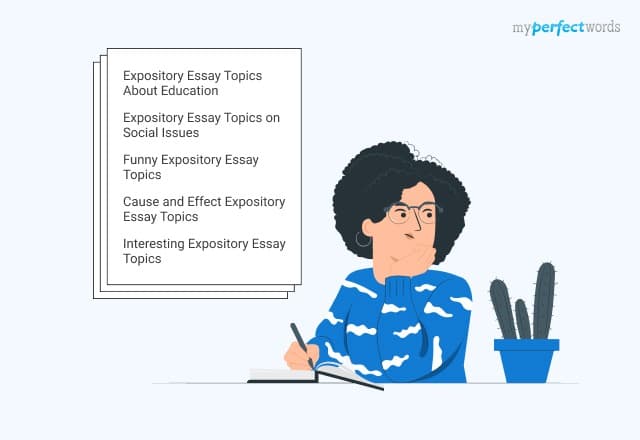
- How it works

How to Write an Expository Essay
Published by Grace Graffin at August 17th, 2021 , Revised On July 26, 2023
Expository means “to describe or explain something” . It is related to the words ‘exposition’, ‘expound’, and ‘expose’ – to explain or reveal the meaning, to lay open, speak one’s mind.
Whenever there is a need to gather research and describe an idea, a topic , or a process clearly and logically, it is done in the form of an expository essay .
An expository essay requires the writer to take a balanced approach to the subject matter rather than justifying a particular point of view.
Expository essays are assigned to students to evaluate their subject knowledge and composition skills. When compared with argumentative essays , they involve a lot less research.
Definition of Expository Essay
“The expository essay is the type of essay that involves an investigation of an idea or topic, appraises relevant supporting evidence material, and presents an argument in a clear and concise manner. ”
When to Write an Expository Essay
Your school or university could assign an expository essay to you as coursework or as part of an online exam.
However, the guidelines may or may not clearly state that your assignment is an expository essay. If that is the case, then look for keywords like ‘explain’, ‘describe’, ‘define’, etc., to be sure that what has been asked for is an expository essay.
You might even be asked to explain and emphasise a particular concept or term. Writing a simple definition will not be enough because you will be expected to explore the ideas in detail.
Writing an Expository Essay
An expository essay should not be based on your personal experiences and opinions. It rather takes an objective approach. You will be expected to explain the topic in a balanced way without any personal bias.
Make sure to avoid the first and second person (“I” and “You”) when writing an expository essay.
How to Structure an Expository Essay
The structure and format of your expository essay assignment will depend on your school’s guidelines and the topic you are investigating. However, it is always a good idea to develop an outline for your essay before starting to work.
The Five-Paragraph Essay Writing Approach
An expository essay will require you to take the five-paragraph essay approach: an introductory paragraph , a main body paragraph , and a concluding paragraph . This is often referred to as the hamburger style of the essay because, like a hamburger, it contains five main parts: the introduction and conclusion being the bun that encapsulates everything.
Rationale and Thesis Statement
Start your essay with a rationale and thesis, also known as the thesis statement , so your readers know what you set out to achieve in your expository essay assignment. Ensure the thesis statement is narrow enough to follow the guidelines in the assignment brief. If the thesis statement is weak and too broad, you will struggle to produce a flawless expository essay.
The Framework
Construct a framework, so you know what elements will constitute the basis of your essay.
Expository Essay Introduction
Like other essay types , an expository essay begins with an introduction , including a hook, background to the topic, and a thesis statement. Once you have grabbed the readers’ interest, it will be easier to get them to read the remaining essay.
Frequently Asked Questions
Will i need the skill of expository writing after i finish my studies.
It depends on what you are studying for. While you might or might not write any more expository essays after your formal education has ended, the skill will be very useful in certain careers, such as business reports, journalism, and in scientific and technical writing.
How does an expository essay differ from an argumentative essay?
An argumentative essay is usually longer and requires more research. It starts with a claim about something that will need supporting evidence. And both sides of the argument need to be discussed. In an expository essay, there is no requirement to make an original argument and defend/support it.
What is the purpose of expository essays?
This style of essay is necessary when you have to showcase your knowledge on a given subject, or your ability to gather research on one and present your findings.
How long is an expository essay?
There is no fixed length but an expository essay could be part of an exam, in which case it might only be 1,000 words or less. They are usually shorter than argumentative essays . It can depend on the subject under discussion. You will likely be given instructions on the required word count.
Are there different types of expository essay?
There are six different types of expository essay, each with a different purpose.
The six types are:
Process essay – describing a task, a method, how to complete something Cause and effect essay – why something happened and its effects Problem-solution essay – provide analysis of problems and their solutions Compare and contrast essay – describe the similarities and differences between two subjects Definition essay – define the topic in detail and explain the how, what, and why Classification essay – separate the topic’s categories and define them in detail
When you are assigned your essay, you should be able to distinguish which of these approaches you are required to take.
You May Also Like
The length of an academic essay depends on your level and the nature of subject. If you are unsure how long is an essay then this article will guide you.
An essay outline – an underrated part of essay writing – brings forth the structure for the writers as they initiate the essay drafting process.
Identifying the causes and reasons why so many students struggle with essay writing can help students avoid these mistakes and write a perfect essay.
USEFUL LINKS
LEARNING RESOURCES

COMPANY DETAILS

- How It Works
expository essay
What is expository essay definition, usage, and literary examples, expository essay definition.
An expository essay [ik-SPOZ-ih-tohr-ee ess-ay] is an essay in which the writer researches a topic and uses evidence to inform their readers or clarify the topic. They can take many forms, including a how-to essay, an essay that defines something, or an essay that studies a problem and offers a solution.
The Five-Paragraph Model
Most expository essays follow the five-paragraph essay model:
- Introduction: The introduction contains the thesis statement or main point of the essay. Here, the writer describes the subject and gives necessary context .
- Body: This section is usually three or more paragraphs and offers supporting evidence for the thesis.
- Conclusion: The conclusion revisits the thesis and summarizes the writer’s main points.
Types of Expository Essays
There are several types of expository essays that can be written.
- Cause and Effect: These essays question why something happened and the outcome of that occurrence. For example, an essay of this type might question why there’s a large homeless population in Seattle and what effects it has on the city and its citizens.
- Classification: These break a broad subject down into several, in-depth subcategories. A classification essay might study the various kinds of movies, define genres, and break the most common genres down by subgenre (for example, action thriller and action adventure as subgenres of the action genre).
- Compare and Contrast: These essays lay out the similarities and differences of at least two subjects. One such essay might compare two different novels by the same author. These essays can explore the pros and cons of different choices as well, like living in the city versus living in the country.
- Definition: As indicated, a definition essay describes or defines something. For example, it might define the internet and provide a detailed explanation of how it works.
- How-To: Also called a process essay, a how-to essay gives the reader steps for creating or doing something. For example, a process essay might walk its reader through setting a table, step by step.
- Problem and Solution: This type of essay explores a problem and, using evidential support, offers potential solutions. For example, a writer might consider the example of Seattle’s homeless population, cite a solution that other cities have used successfully, and propose that same solution for Seattle.
Other Forms of Expository Writing
In addition to the aforementioned, there are other uses for expository writing. Most commonly:
- Newspaper articles
- Encyclopedic entries
- Manuals/assembly instructions
Expository vs. Argumentative Essays
Expository essays are like argumentative essays in that they both require research. Unlike argumentative essays, expository essays are meant to inform their audience rather than persuade it.
Argumentative essays are often controversial and contain the writer’s personal opinions, whereas expository essays give factual information and explore a topic from many perspectives . Educational spheres often use expository essays to test writing ability, reading comprehension, and/or the writer’s understanding of a topic.
Examples of Expository Essays
1. Susan Sontag, “Notes on ‘Camp’”
This is a definition essay that explores the meaning and usage of the slang word camp . When she wrote the essay in 1964, people used the word to describe a person or thing as exaggerated, effeminate, or theatrical. Sontag suggests that camp isn’t a solid concept but rather a sensibility, and she acknowledges its connection to contemporary gay culture. Her definition of camp is given in the following passage:
[Camp] is not a natural mode of sensibility, if there be any such. Indeed the essence of Camp is its love of the unnatural: of artifice and exaggeration. And Camp is esoteric–something of a private code, a badge of identity even, among small urban cliques.
2. David Foster Wallace, “Consider the Lobster”
Herein, Wallace reviews the 2003 Main Lobster Festival and questions the morality of boiling lobsters alive. He examines the problem from all facets, including whether a lobster feels pain, without directly asserting his opinion. After descriptions of the festival, physical properties of lobsters, and the common use of the crustaceans, Wallace poses the main question of the essay:
So then here is a question that’s all but unavoidable at the World’s Largest Lobster Cooker, and may arise in the kitchens across the U.S. Is it all right to boil a sentient creature alive just for our gustatory pleasure? A related set of concerns: Is the previous question irksomely PC or sentimental? What does “all right” even mean in this context? Is it all just a matter of individual choice?
3. Rebecca Solnit, “The Longest War”
From Solnit’s 2014 book of essays, Men Explain Things to Me , “The Longest War” explores issues of male violence against women. Solnit uses both statistical and anecdotal evidence to inform her audience of the issue, which supports some of her argumentative essays that appear later in the book:
[T]hough a rape is reported only every 6.2 minutes in this country, the estimated total is perhaps five times as high. Which means that there may be very nearly a rape a minute in the United States. It all adds up to tens of millions of rape victims. A significant portion of the women you know are survivors.
Further Resources on Expository Essays
You can find more examples of expository essays on LiteraryDevices.net .
Bibme.org offers guidance for writing expository essays.
Essaytigers.com provides step-by-step writing instructions and an additional argumentative essay and expository essay comparison.
Related Terms
- Argumentative Essay
- Expository Writing
Expository Essay Writing
Expository Essay Examples

Expository Essay Examples for Students
10 min read
Published on: May 18, 2020
Last updated on: Mar 25, 2024

People also read
Expository Essay Writing - Types, Format, Topics & Examples
Good Expository Essay Topics to Impress Everyone
Expository Essay Outline - Format Guide with Samples
Types of Expository Writing - Tips & Examples
Share this article
Are you looking to dive into the world of expository essays? Whether you're a student or a writer, understanding what makes a great expository essay is essential.
In this comprehensive guide, we'll explore the concept of expository essays and provide you with 10+ examples to illustrate various aspects and styles of expository writing.
On This Page On This Page -->
Key Features of Expository Essays
An expository essay is all about explaining, not persuading or giving step-by-step instructions. Unlike argumentative essays that aim to convince, expository essays provide information without personal opinions. They differ from process essays , which guide you through steps, and are also different from news articles.
There are different types of expository essays , each serving a unique purpose and requiring distinct approaches to presenting information.
Expository essays mainly focus on the 5 Ws:
Here are some additional features of an expository essay:
- Clarity: Expository essays should be written in a clear and straightforward manner, making it easy for the reader to understand the information presented.
- Objective Tone: Writers should maintain an objective tone throughout the essay, avoiding personal bias or emotional language.
- Thorough Research: Expository essays rely on credible sources and factual evidence to support the topic or thesis statement.
- Logical Organization: Essays should follow a logical structure and a clear outline. Check out our expository essay outline blog to learn how to structure your essay correctly.
Expository Essay Format Example
Expository essays typically follow a five-paragraph format; they provide a clear and structured framework for presenting information.
Examples of Expository Essays
Here are some good sample expository essays in easily downloadable PDF form that you can follow to write your essay.
5th grade Expository Essay Examples
6th grade Expository Essay Examples
7th grade Expository Essay Examples
8th grade Expository Essay Examples
Expository Essay Examples Middle School
Expository Essay Examples For High School
Expository Essay Examples College
Expository Essay Examples University
Expository Essay Examples about Covid 19
Expository Essay Examples Cause and Effect
Informative Expository Essay Examples
Short Expository Essay Examples
Let's take a look at some short essays:
Example 2:
Expository Essay Examples Topics
The following topics encompass a range of current and relevant issues, providing opportunities for in-depth exploration in expository essays.
- The Impact of Social Media on Mental Health
- The Rise of Online Learning: Advantages and Challenges
- The Role of Artificial Intelligence in Modern Society
- The Importance of Financial Literacy for Young Adults
- The Influence of Video Games on Youth Behavior
- The Evolution of Gender Roles in the 21st Century
- The Effects of Urbanization on the Environment
- The Phenomenon of Fake News and Its Impact on Society
- The Ethics of Genetic Engineering and Biotechnology
Need more ideas? Visit the Expository essay topics blog to get plenty of inspiring topic ideas!
Tips to Write an Expository Essay
Expository essays are a common assignment in academic settings, designed to inform, explain, or describe a particular topic or idea. To draft a successful expository essay, follow this writing approach:
- Choose a Topic: Select a subject that you can thoroughly explain or analyze. It could be anything from historical events to scientific concepts or social issues.
- Research: Gather relevant information and evidence to support your thesis statement. Use reputable sources such as academic journals, books, or credible websites.
- Create an Outline: Organize your thoughts and ideas into a structured outline. Start with an introduction that includes a clear thesis statement, followed by body paragraphs that each focus on a specific aspect of the topic. Finally, conclude by summarizing the main points and restating the thesis.
- Write the Introduction: Begin with an attention-grabbing hook to engage the reader. Provide background information on the topic and introduce your thesis statement, which outlines the main argument or purpose of the essay.
- Develop Body Paragraphs: Each body paragraph should focus on a single main idea or point related to your thesis. Start with a topic sentence that introduces the main point, followed by supporting evidence and examples. Ensure that each paragraph flows logically and transitions smoothly to the next.
- Use Transitional Words: Incorporate transition words and phrases to connect ideas and improve the flow of your essay. Examples include "furthermore," "however," "in addition," and "on the other hand."
- Write the Conclusion: Summarize the main points of your essay and restate the thesis statement in a new light. Avoid introducing new information in the conclusion and instead focus on reinforcing the significance of your argument.
- Revise and Edit: Take time to review your essay for clarity, coherence, and grammar errors. Ensure that your writing is concise and that each sentence contributes to the overall effectiveness of the essay.
Wrapping it Up!
Expository essays serve as valuable tools for conveying information, explaining complex concepts, and exploring diverse topics. By studying these 10+ examples, you can gain insight into the structure, style, and content of expository writing.
Remember, the key to writing an effective expository essay lies in clarity, objectivity, and thorough research.
If you are still unsure about your writing abilities, simply get help from professionals. At CollegeEssay.org , we have qualified and expert writers who can help you write any academic essay.
We guarantee to provide you with a well-written assignment within the given deadline. Just place your ' write college essay for me ' request now and let all your worries go away.
Try our AI essay writing tools for efficient results!
Frequently Asked Questions
What is a good expository essay topic.
Here are some good expository essay topics for your help.
- What is your favorite school subject?
- Explain why teens do drugs.
- How would you stop racism?
- What is it like to live with a pet?
- How to take care of yourself?
Cathy A. (Literature, Marketing)
For more than five years now, Cathy has been one of our most hardworking authors on the platform. With a Masters degree in mass communication, she knows the ins and outs of professional writing. Clients often leave her glowing reviews for being an amazing writer who takes her work very seriously.
Paper Due? Why Suffer? That’s our Job!

Keep reading

Legal & Policies
- Privacy Policy
- Cookies Policy
- Terms of Use
- Refunds & Cancellations
- Our Writers
- Success Stories
- Our Guarantees
- Affiliate Program
- Referral Program
- AI Essay Writer
Disclaimer: All client orders are completed by our team of highly qualified human writers. The essays and papers provided by us are not to be used for submission but rather as learning models only.
Purdue Online Writing Lab Purdue OWL® College of Liberal Arts
Welcome to the Purdue Online Writing Lab

Welcome to the Purdue OWL
This page is brought to you by the OWL at Purdue University. When printing this page, you must include the entire legal notice.
Copyright ©1995-2018 by The Writing Lab & The OWL at Purdue and Purdue University. All rights reserved. This material may not be published, reproduced, broadcast, rewritten, or redistributed without permission. Use of this site constitutes acceptance of our terms and conditions of fair use.
The Online Writing Lab at Purdue University houses writing resources and instructional material, and we provide these as a free service of the Writing Lab at Purdue. Students, members of the community, and users worldwide will find information to assist with many writing projects. Teachers and trainers may use this material for in-class and out-of-class instruction.
The Purdue On-Campus Writing Lab and Purdue Online Writing Lab assist clients in their development as writers—no matter what their skill level—with on-campus consultations, online participation, and community engagement. The Purdue Writing Lab serves the Purdue, West Lafayette, campus and coordinates with local literacy initiatives. The Purdue OWL offers global support through online reference materials and services.
A Message From the Assistant Director of Content Development
The Purdue OWL® is committed to supporting students, instructors, and writers by offering a wide range of resources that are developed and revised with them in mind. To do this, the OWL team is always exploring possibilties for a better design, allowing accessibility and user experience to guide our process. As the OWL undergoes some changes, we welcome your feedback and suggestions by email at any time.
Please don't hesitate to contact us via our contact page if you have any questions or comments.
All the best,
Social Media
Facebook twitter.

Reflective Essay
Reflective essay generator.

Sometimes, it is our experiences that startled and challenged our own voyage that strengthens and improves us to be the best versions of ourselves. If your life experience greatly moved you, there is a certain essay that allows you to compose your own endeavor. In this article, read through because we will be discussing the fundamentals of writing a reflective essay.
They say that being wise is better than being knowledgeable. Wisdom is acquired through reflection of one’s experience as well as of the environment. The more we reflect the more we become aware of ourselves. We become mindful of our existence as well as the meaning of life and all the things that surround us. Here we present different formats of essays like essays in doc .
Reflective Essay Outline Template
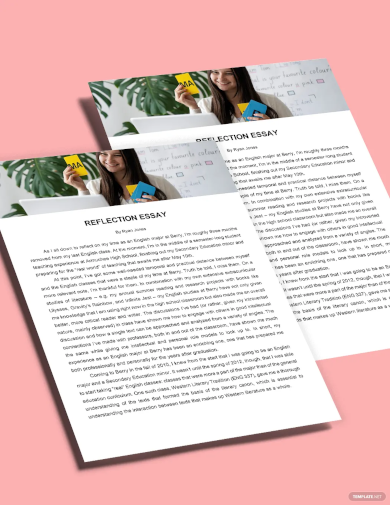
- Google Docs
Size: 188 KB
Reflective Essay About Life Experience
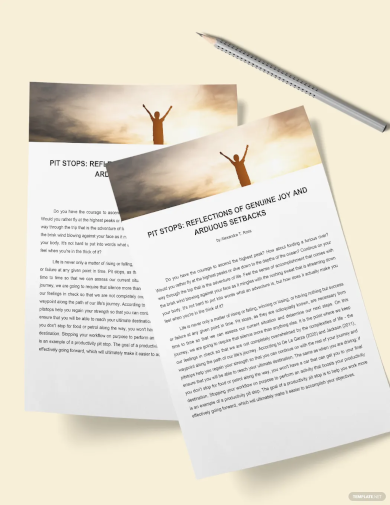
- Apple Pages
Size: 142 KB
Reflective Essay Template

Size: 237 KB
Self Reflective Essay Template
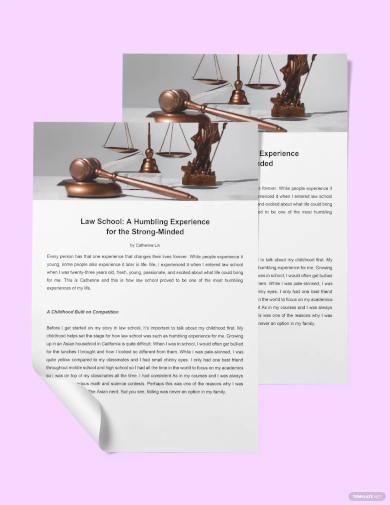
Size: 114 KB
Personal Reflective Essay Template
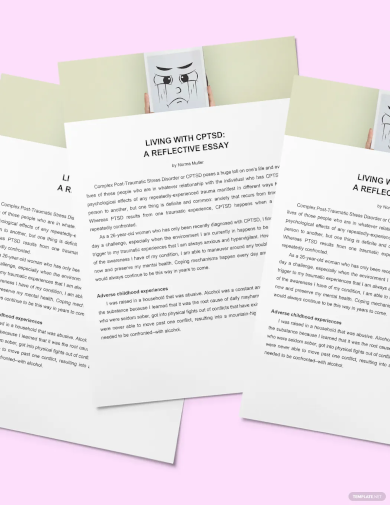
Size: 126 KB
Personal Reflective Sample
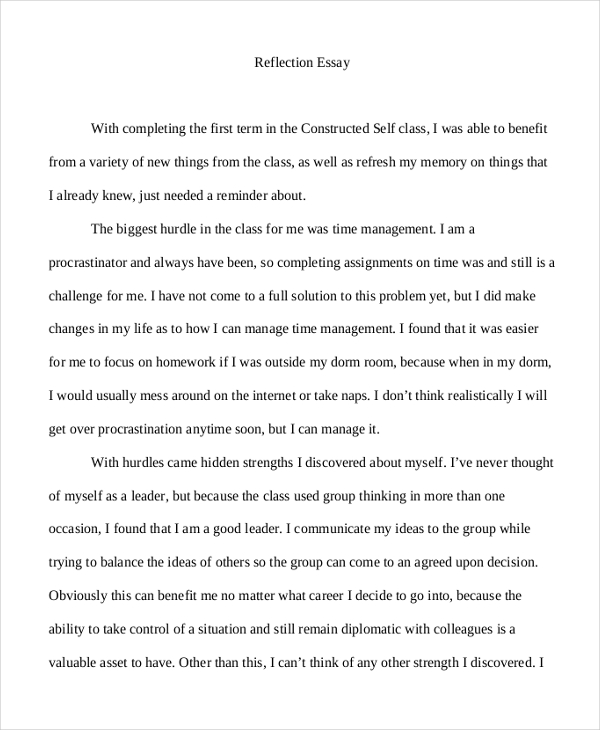
High School Essay
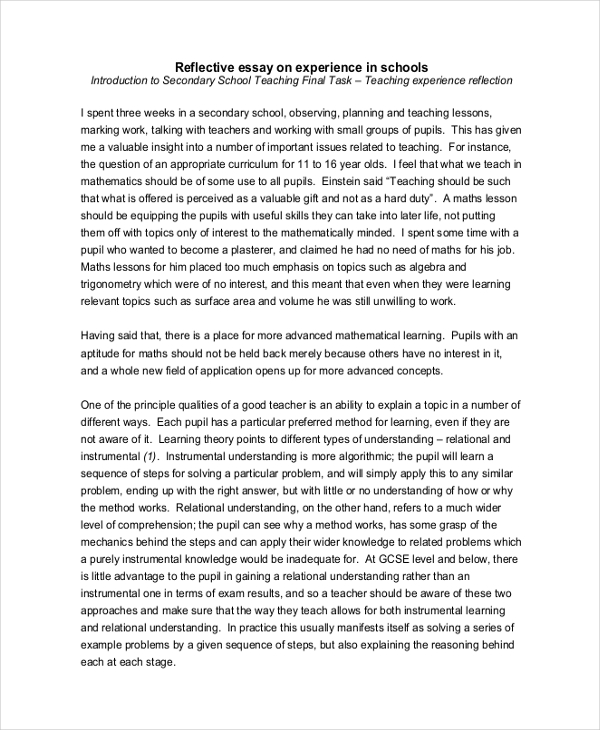
- PDFReflective Essay Example Reflective Essay Example Reflective Essay Example
Size: 102 KB
Reflective Essay Outline
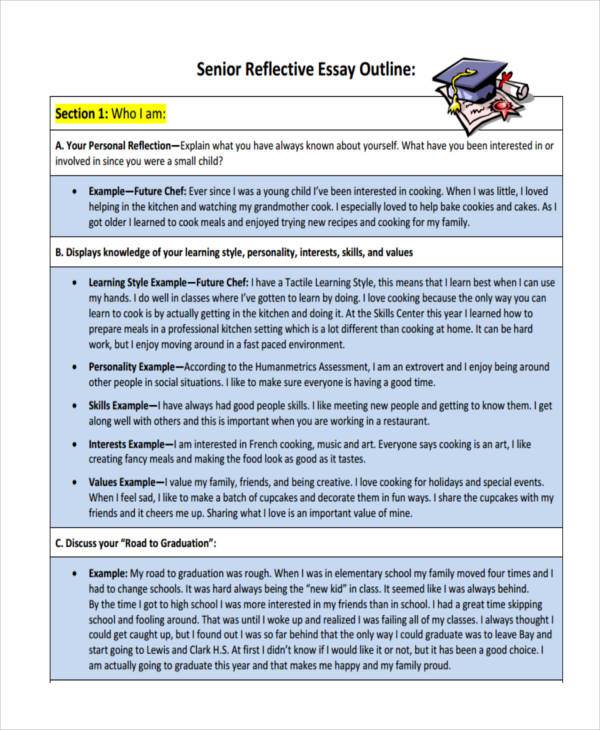
Size: 247 KB
Student Reflective Example
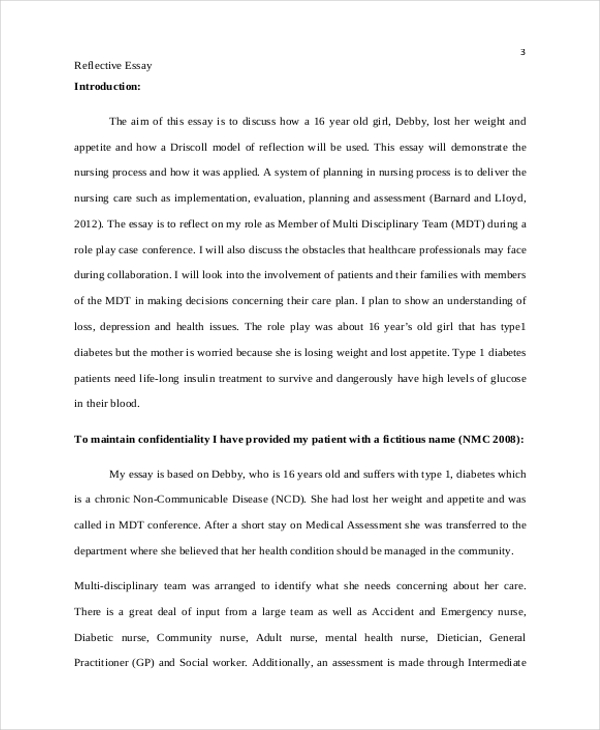
Size: 42 KB
Communication Reflective
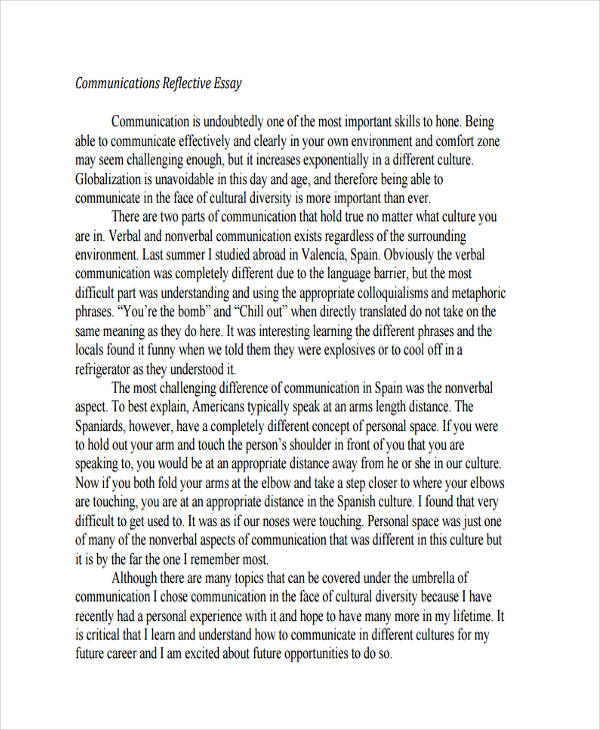
Size: 66 KB
What Is a Reflective Essay?
A reflective essay is a written piece of literature that focuses on presenting and narrating a person’s experience and how it becomes an instrument towards a change of perception in life.
It is a way for a writer to share an important event in his/her life and how it affected him/her so that others may learn something from it. Reflective writing root on life-changing events. The writer shares a specific experience, provides a narration of the incident including the material elements. It offers a realization so that others who may have had the same experience can draw out a shared mutual lesson from it.
How to Write a Reflective Essay
To write a reflective short essay , you need to have the right disposition as well as the momentum. Remember that you are not just writing to say something but to share an important lesson in life.
1. Think of an important event. What you will be writing on your reflective essay is something that is rooted in your own personal experience or encounter of something. Think deep and concentrate. You may also see personal essay examples & samples.
2. Introduce your topic. In your introduction, write the concrete event or experience that you want to share. Pattern it in a story form.
3. Develop your point. Write the main content of your essay with at least three to five paragraphs supporting your main topic.
Final Reflective Essay
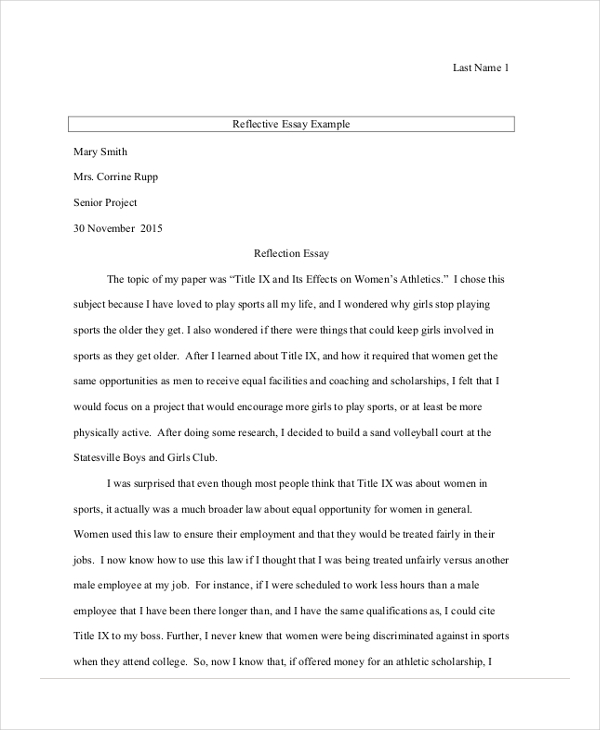
Size: 49 KB
Internship Reflective Essay
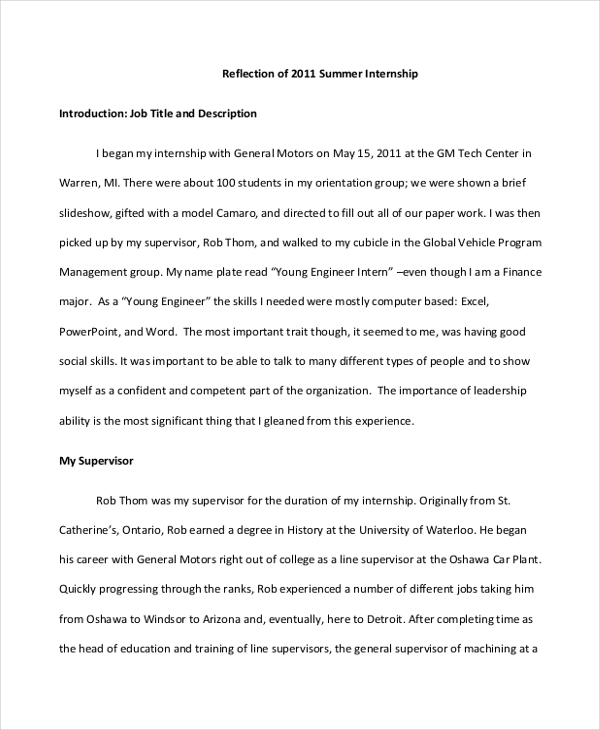
Size: 285 KB
Leadership Reflective Example

Size: 634 KB
Nursing Reflective Essay
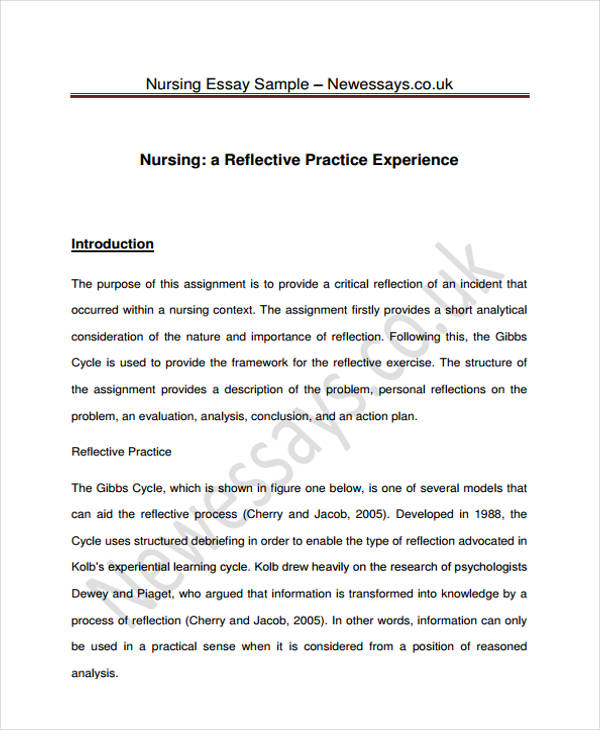
Size: 331 KB
Research Reflective Example
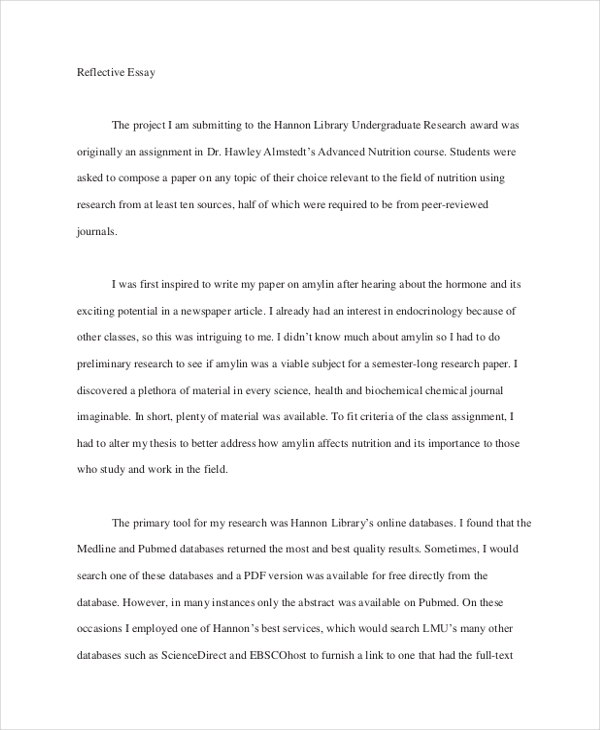
Size: 155 KB
Tips on Writing a Reflective Essay
Writing a reflective essay is not persuasive writing where you have to convince your readers to accept your opinion. You simply have to share an experience.
1. Write a draft. Do not jump hastily onto formal writing . Write a draft where you can create a bulleted list of the things that you want to share.
2. Think logically. When presenting a story, do it in a chronological manner so that your readers can understand the plot. Do this as well when presenting your ideas.
3. Create a summary. Use a summary writing to briefly state your insights and to give your final thoughts of the topic.
Importance of a Reflective Essay
In this era that we currently live in, personal reflection can be considered a thing of the past. Because of the gradual change and development of the things around us, we find it difficult to pause and reflect on the things that happen to our lives. You may also see academic essay examples .
The importance of writing an essay is to present to us the things that we rarely encounter in our day-to-day activities. In this time when material things are all that mattered, we have become unappreciative of the abstract things like love, compassion, and mercy. We cannot learn these things from those electronic gadgets that keep us busy.
How to Start a Reflective Essay Correctly
As mentioned above, a reflective essay presents and narrates the experience of a writer and how it changes the way he/she perceives life. In a simpler sense, it talks about how the author reflected on a certain adventure. As an essayist, since it’s you who bears the story and lessons, you are the one who is responsible for expressing it.
Just like any other composition, it’s your introduction that catches the attention of the reader. Thus, in order for your essay to be fully read, it is important to start your essay remarkably. If you find writing an introduction for your reflective essay challenging, don’t worry, you’re not alone. In this section, we are going to slowly tackle the ways to compose a compelling introduction.
1. Being catchy is the key.
In writing your reflective essay, you must start with something that would captivate the readers right away. Since the purpose of the introduction is to grab some attention, you may include some unique and interesting facts or beliefs. In this part, showcase your creativity by adding an introduction that is written in a bizarre manner and not those that depict cliché experience. You may also utilize a highly moving quotation or a dialogue that would also be appropriate for your reader.
2. Write the thesis statement in one sentence.
A thesis statement refers to the sentence that carries the topic being discussed in the whole essay. Therefore, it bears the central idea in which your essay revolves around. In writing your own essay, construct this statement in a clear and concise sentence. In this way, the reader will have a better grasp of your topic and would be clearly oriented on what you want to convey. In most cases, thesis statements are written at the end of the introduction.
3. Stick to the first person POV.
Remembering that this essay is subjective and depends on the author’s interpretation, it is important to use the first person point of view. By using this POV, it would be easier for you to convey your thoughts and opinions, and it would engage you to the readers like you’re telling a story in person. The first person involves the pronouns I , me , my , and mine .
4. Keep it brief.
When it comes to writing your own essay, you must perceive what your readers feel or see in reading your composition. Always put into mind that readers also have their own time to spend, and without a mark in the writing industry, people won’t invest much time on reading your essay. Thus, it is important to keep your composition concise. You can utilize a paragraph of five to ten sentences in your introduction. Using this number of sentences, you must already express a complete and clear thought of an essay that is worth reading.
Reflective Essay Example
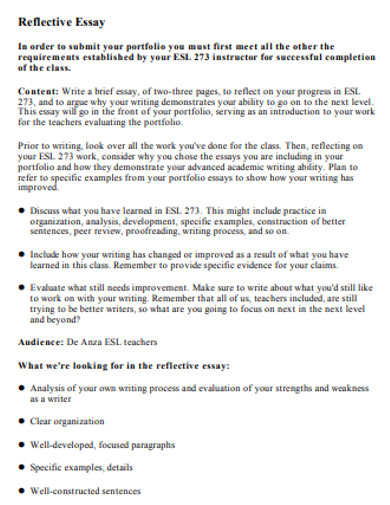
Size: 73 KB
Reflective Essay Assessment
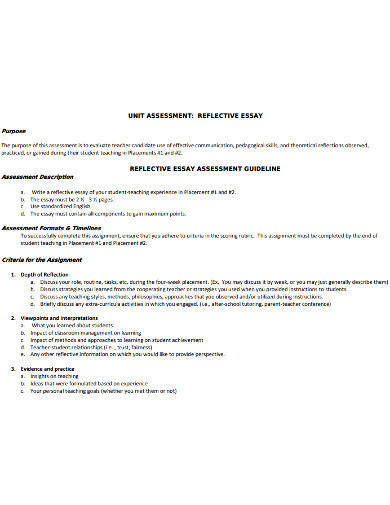
Size: 99 KB
Reflective Essay Format
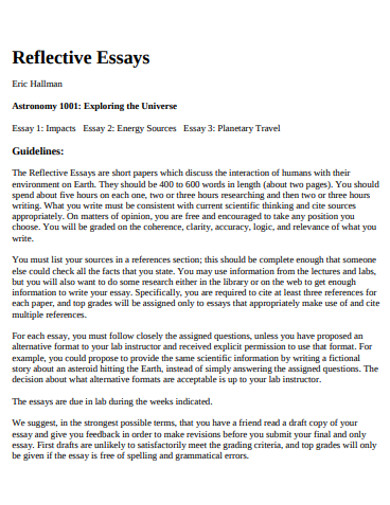
Size: 278 KB
Basic Reflective Essay
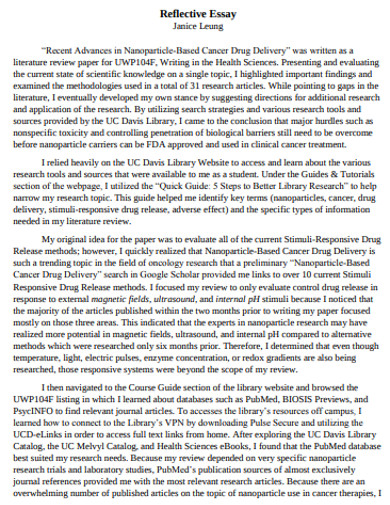
Size: 81 KB
Reflective Final Essay
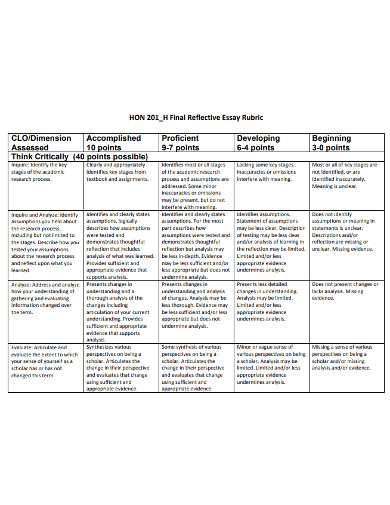
Size: 85 KB
Sample Reflective Essay
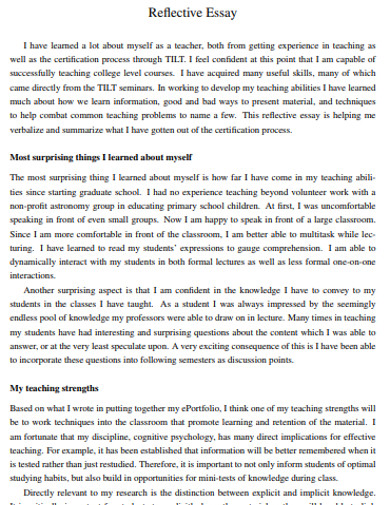
Size: 38 KB
Simple Reflective Essay Example
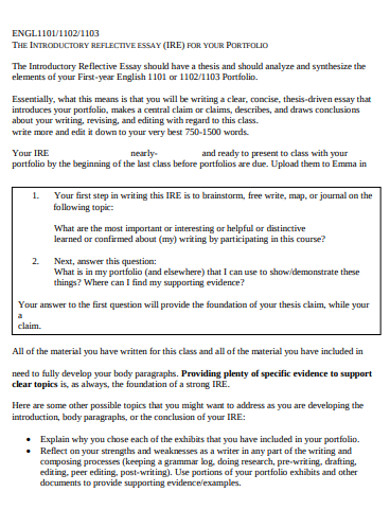
Size: 193 KB
Standard Reflective Essay
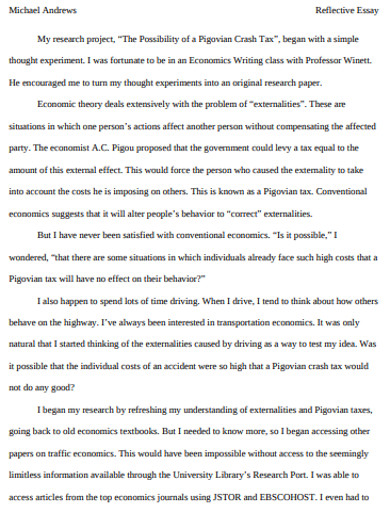
Professional Reflective Essay
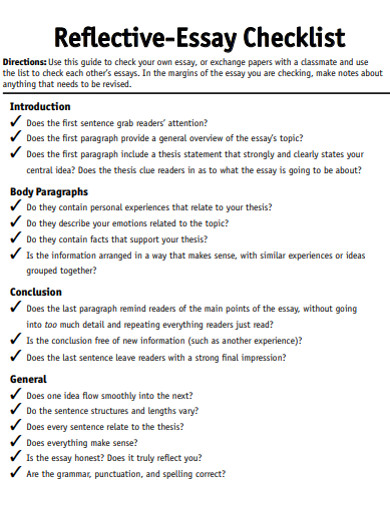
Size: 264 KB
Sample Reflective Essay in PDF
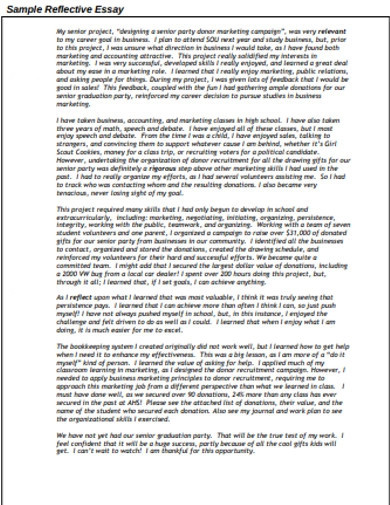
Size: 26 KB
Text prompt
- Instructive
- Professional
Write a Reflective Essay on your most meaningful learning experience.
Create a Reflective Essay about a time when you showed leadership.

IMAGES
VIDEO
COMMENTS
Expository Essay: It maintains a neutral and objective tone. The writer presents information factually and impartially, without expressing personal opinions or biases. Argumentative Essay: It often adopts a more assertive, persuasive, and subjective tone. The writer takes a clear position and argues in favor of it, using persuasive language.
Expository essay example: Body paragraph. The invention of the printing press in 1440 changed this situation dramatically. Johannes Gutenberg, who had worked as a goldsmith, used his knowledge of metals in the design of the press. He made his type from an alloy of lead, tin, and antimony, whose durability allowed for the reliable production of ...
Step 1. Choose an Appropriate Topic. Brainstorm different ideas to select a compelling expository essay topic. Check out our expository essay topics blog for inspiring ideas. Ensure it has the potential to turn into an informative essay by being able to explain and inform effectively. Step 2.
2. Body paragraph. After understanding how to start an expository essay the next step is to construct substantial body paragraphs. Each body paragraph in an expository essay consists of a topic sentence, its explanation, and a transition statement. A single idea should be introduced in each paragraph.
An expository essay example serves as a valuable tool for students, offering a concrete illustration of the structure, style, and depth expected in this genre of writing. By studying examples, students gain insights into effective thesis formulation, organizing ideas within paragraphs, and integrating supporting evidence to bolster arguments. ...
An expository essay is a type of essay that involves explaining an idea or theme within a given subject or topic. We guide you through writing one with examples.
The expository essay examples will demonstrate how to write an expository essay without missing anything. These examples will help you in understanding the basics and once you are through them, you will be ready to write your essay in no time. THE RISE OF TEENAGE GANGS AND ITS CONSEQUENCES. WAYS STUDENTS CAN SPEND THEIR LEISURE TIME.
Most expository essay prompts will ask you to do one of the following: Define and explain a concept or theory. Compare and contrast two ideas. Examine a problem and propose a solution. Describe a cause and effect relationship. Explain a step-by-step process. Analyze a broad subject and classify examples into groups.
Formatting an expository essay. The typical format for an expository essay in school is the traditional five-paragraph essay. This includes an introduction and a conclusion, with three paragraphs for the body of the paper. Most often, these three paragraphs are limited to one subtopic each. This is the basic essay format, but expository writing ...
The expository essay is a genre of essay that requires the student to investigate an idea, evaluate evidence, expound on the idea, and set forth an argument concerning that idea in a clear and concise manner. This can be accomplished through comparison and contrast, definition, example, the analysis of cause and effect, etc.
The term expository writing refers to any writing that's designed to explain something. We use the word expository to describe any passage of writing that's supposed to present information and help you understand it in an objective way. Some common examples of expository writing include academic essays, textbooks, instructional guides, and ...
Here are some tips for writing a good expository essay: Ensure the essay has a clear and narrowly defined topic for effective exploration. Present facts, statistics, and evidence without incorporating personal opinions or biases. Utilize a well-structured format with logical sequencing of ideas and paragraphs.
Writing an Expository Essay. An expository essay should not be based on your personal experiences and opinions. It rather takes an objective approach. You will be expected to explain the topic in a balanced way without any personal bias. Make sure to avoid the first and second person ("I" and "You") when writing an expository essay.
How to Write an Expository Essay in 5 Steps. Written by MasterClass. Last updated: Jun 7, 2021 • 3 min read. Learning how to write a good expository essay is an academic writing skill that lays the foundation for the type of expository writing that's necessary for numerous professions.
Section 1 Essay structure An essay is a piece of writing made up of a number of paragraphs. Each paragraph has a specifi c role in an essay. In a fi ve-paragraph essay, the fi rst paragraph is an introduction; the second, third, and fourth paragraphs form the body of the essay; and the fi fth paragraph is a conclusion (see diagram on page 4).
Examples of Expository Essays. 1. Susan Sontag, "Notes on 'Camp'". This is a definition essay that explores the meaning and usage of the slang word camp. When she wrote the essay in 1964, people used the word to describe a person or thing as exaggerated, effeminate, or theatrical. Sontag suggests that camp isn't a solid concept but ...
Expository Essay Conclusion Example. In conclusion, the impact of social media on mental health is multifaceted and complex. While social media offers valuable opportunities for social connection and support, it also presents significant challenges and risks for individuals' psychological well-being. By fostering awareness, promoting digital ...
An expository essay is one which is used to explain something, in the most simple terms. The word expository comes from the word expose, and this means to uncover something so that other people are able to understand it for what it is. This type of essay is therefore used as a way of explaining or clarifying the subject for the reader.
An expository essay is a genre of writing that investigates an idea, evaluates evidence, expounds on the idea, and sets forth an argument concerning that idea in a clear and concise manner. This type of essay requires the writer to define a topic, use examples, statistics, and facts to explain it to the reader.
Get past the thesis statement with two examples of expository essays. Learn more about the format, requirements, and types of expository writing for middle and high school.
Expository Essay Definition. Expository essays are fact-based essays focused on proving their writers' point. A variety of different structures can be used to argue for, and support, that point ...
Mission. The Purdue On-Campus Writing Lab and Purdue Online Writing Lab assist clients in their development as writers—no matter what their skill level—with on-campus consultations, online participation, and community engagement. The Purdue Writing Lab serves the Purdue, West Lafayette, campus and coordinates with local literacy initiatives.
Writing Programs. Four Types of Writing Printable - Classroom Freebies. Refer your students this free Types of Writing printable to introduce to or remind them of the 4 main types of writing: narrative, expository, persuasive, and descriptive. Each type of writing includes a short definition. Great for writers' notebooks!
Think of an important event. What you will be writing on your reflective essay is something that is rooted in your own personal experience or encounter of something. Think deep and concentrate. You may also see personal essay examples & samples. 2. Introduce your topic. In your introduction, write the concrete event or experience that you want ...